May 23, 2025 | 12:08 GMT +7
May 23, 2025 | 12:08 GMT +7
Hotline: 0913.378.918
May 23, 2025 | 12:08 GMT +7
Hotline: 0913.378.918
In Tan Hiep district, Kien Giang province, the summer-autumn rice crop ended successfully in both yield and selling price, creating motivation for farmers to start producing the third rice crop of the year. In mid-August, Tan Hiep farmers finished the sowing schedule for 2023 autumn-winter rice, with the sowing area far exceeding the plan.
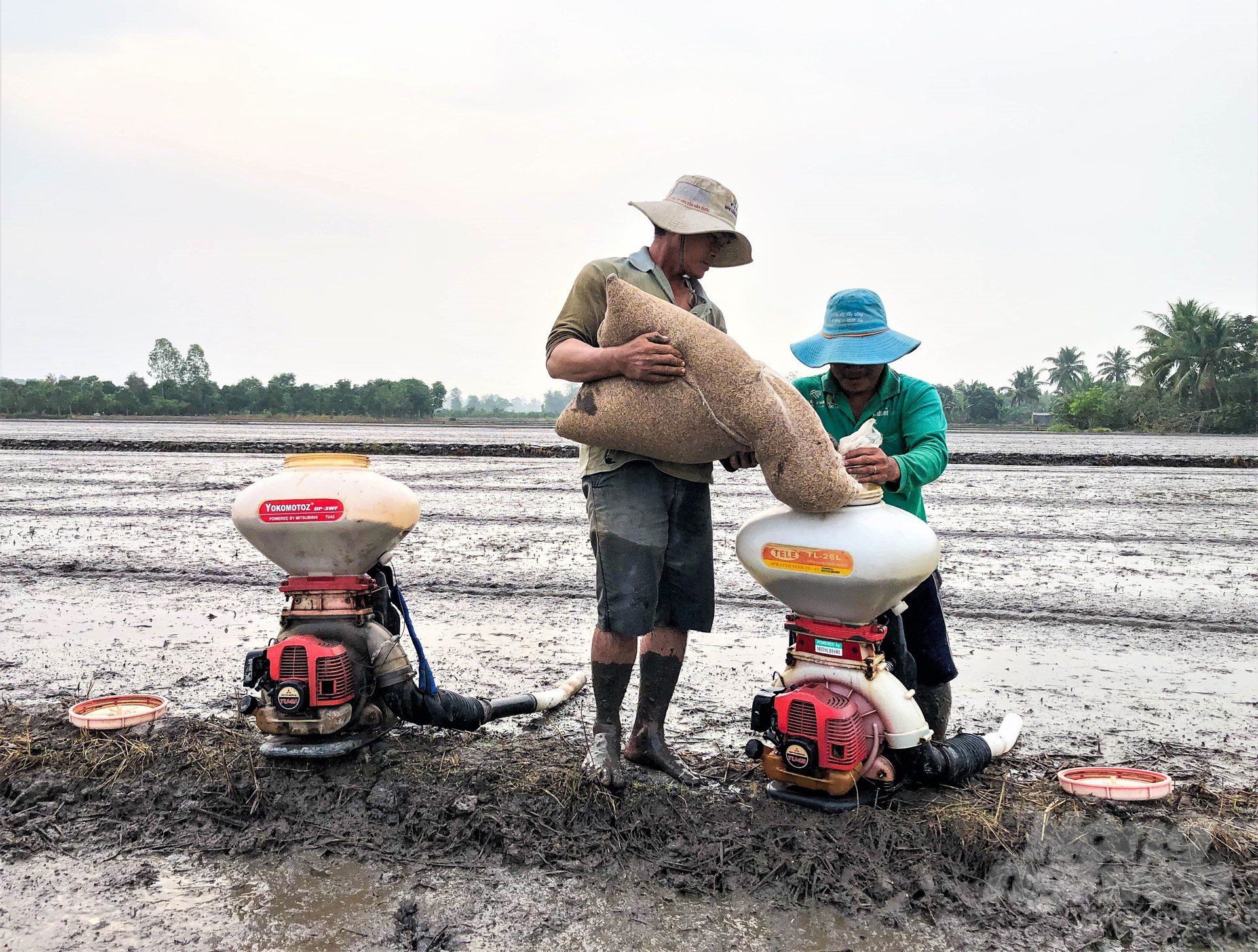
Farmers in Tan Hiep district actively sowed 2023 autumn-winter rice seed. So far, the whole district has increased the area by approximately 6,000 ha over the plan. Photo: Kim Anh.
Head of Tan Hiep Agriculture and Rural Development Bui Quoc Duy was excited to announce that by mid-August, farmers in the district had sown 27,634 ha of 2023 autumn-winter rice, an increase of approximately 6,000 ha over the plan. Most of the rice area is in the stage of seedling and tillering, actively taken care of by farmers, and growing well. The main varieties in the autumn-winter crop include OM 18 and OM 5451, which occupy most of the area; the rest are OM 34 and IR 50404.
According to Mr. Duy, as for the rice crops in 2023, the district has organized production in large fields associated with businesses via consumption association contracts. Specifically, in the winter-spring crop of 2022-2023, 31 large fields were implemented, with a total of 2,674 ha of area contracted for output consumption. In the summer-autumn crop of 2023, 19 large fields were implemented, with a total contracted area of 2,552 ha.
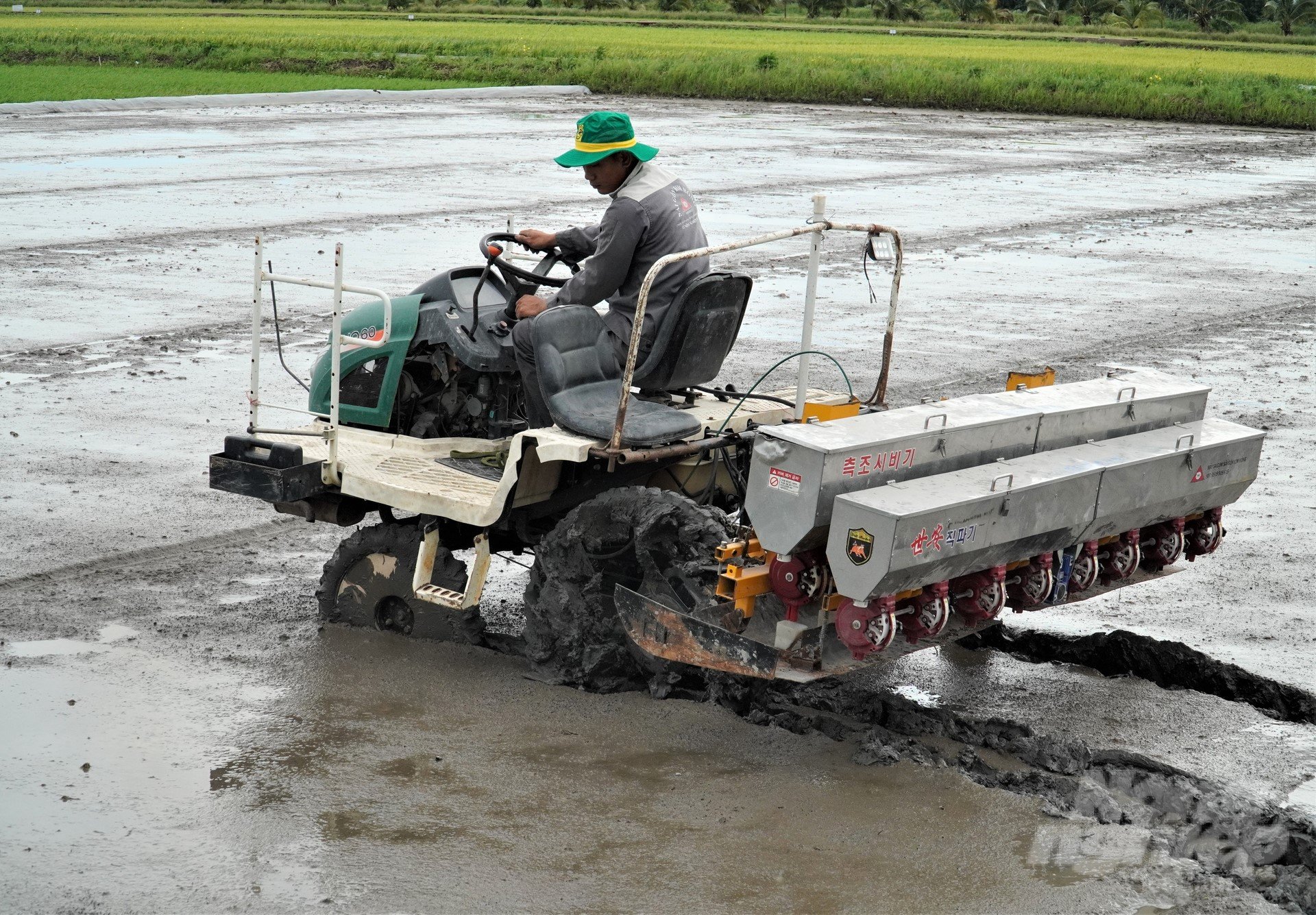
In the 2023 autumn-winter rice crop, Mekong Delta farmers promote mechanization of the sowing stage and use cluster sowing machines in combination with burying fertilizers, both reducing the amount of rice seed and increasing the efficiency of fertilizer use, saving labor. Photo: Kim Anh.
In order to produce the autumn-winter rice crop effectively, the Tan Hiep Department of Agriculture and Rural Development, in collaboration with the District Agricultural Service Center, regularly monitors pests every 7 days and assigns technical staff to regularly inspect the fields at the pest investigation points and promptly inform the Crop Production and Plant Protection Sub-Department and the locality to give directions and help farmers minimize the damage caused by pests.
As of August 15, the sowing area of the whole Kien Giang province reached 80,550/71,200 ha as originally planned, exceeding over 9,000 ha. According to the Kien Giang Department of Agriculture and Rural Development, with farmers’ active investment in production and acceleration of sowing progress, it is likely that the area of this rice crop will exceed the plan by 10,000–12,000 ha, bringing the autumn-winter rice area of the whole province to 83,000 ha.
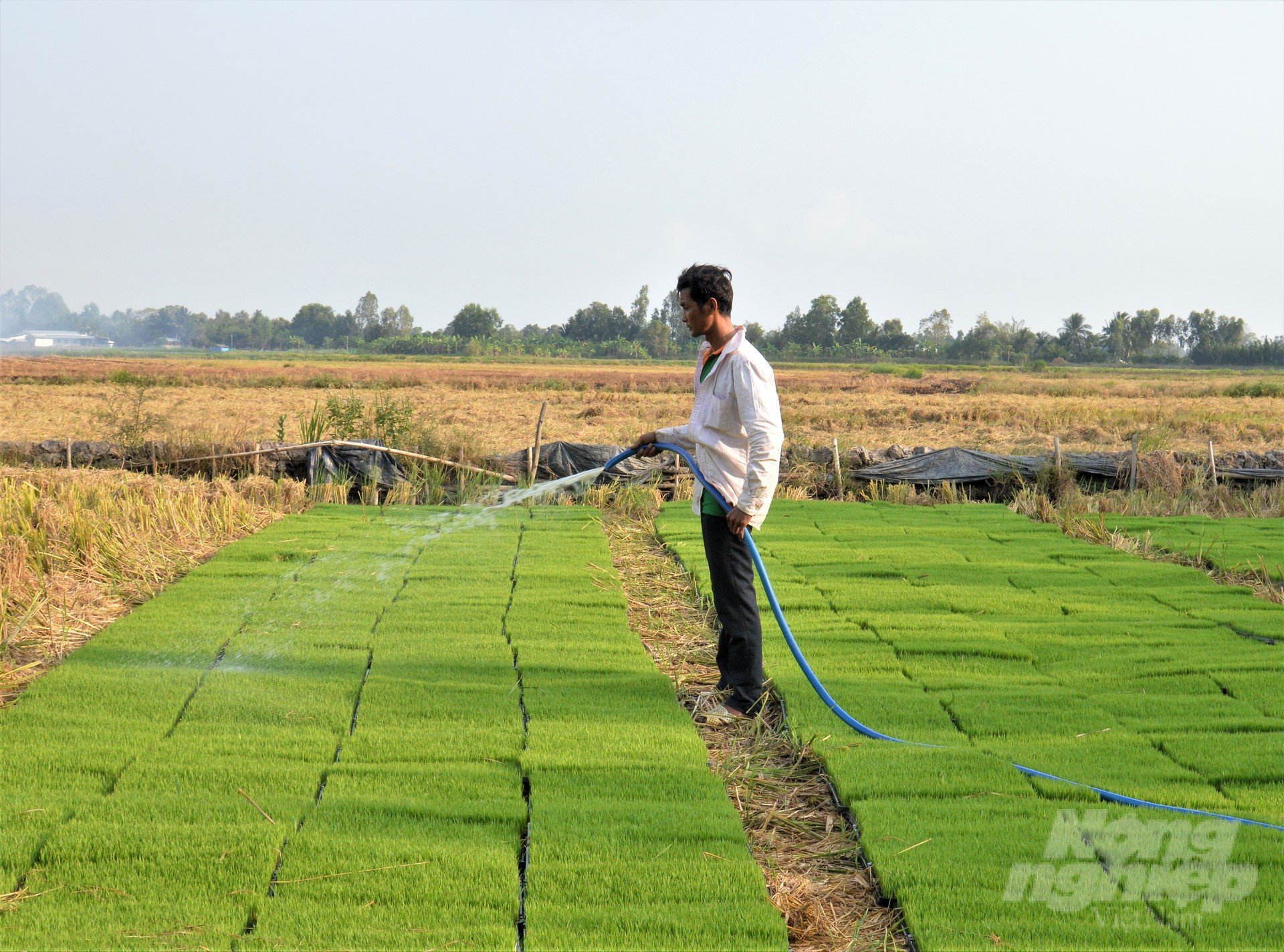
Farmers make seedlings to transplant by machine, helping farmers have more time to prepare land for effective production of the 2023 autumn-winter rice crop. Photo: Trung Chanh.
Besides increasing the area, Kien Giang province also focuses on organizing large field production associated with consumption linkages. Specifically, since the beginning of the year, 1,334 large fields have been produced, with a total area of 167,225 ha. In which there are 1,026 large fields associated with consumption linkages, with an area of 120,696 ha. Particularly for the 2023 autumn-winter crop, localities have organized the production of 73 large fields with an area of 8,427 ha, of which 71 large fields are associated with consumption linkages with an area of 7,998 ha.
Along with the investment in standard and safe production, as of now, the whole province has 55,666 ha of rice production that meets the standards of VietGAP, GlobalGAP, SRP, organic, and residue control for export to the markets of the EU, USA, and Japan. Regarding management and issuance of rice-growing area codes, 118 codes have been granted with a total area of nearly 6,044 ha, serving mainly for export to markets such as the EU, China, Malaysia, Singapore, and Canada.
The expansion of the autumn-winter rice area has been paid attention to by leaders of the agriculture sector in many localities in the Mekong Delta. As for Can Tho City, according to actual records for the 2023 autumn-winter crop, up until now, the sowing area of Can Tho City has increased by 12% compared to the plan, reaching 67,400/60,300 ha (an increase of more than 7,000 ha). The city's agriculture sector focuses on directing production for two key rice-growing areas. Specifically, the area has been checked and registered to participate in the project of 1 million hectares specializing in high-quality rice cultivation and the area of concentrated rice production in three districts: Vinh Thanh, Co Do, and Thoi Lai.
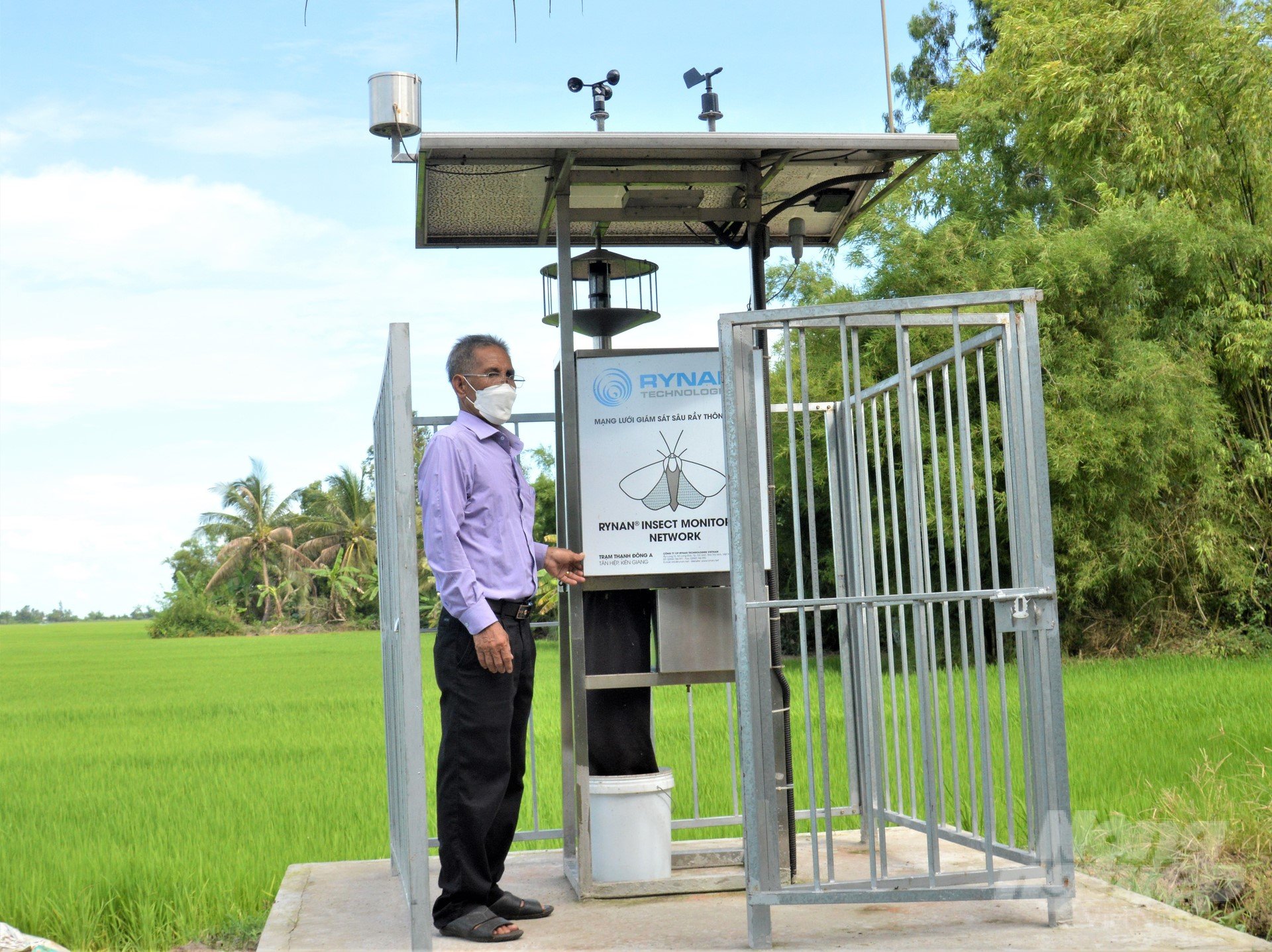
A smart pest monitoring station for agricultural production helps farmers manage pests well and protect 2023 autumn-winter rice effectively. Photo: Trung Chanh.
Mr. Tran Thai Nghiem, Deputy Director of the Can Tho City Department of Agriculture and Rural Development, said that the goal of expanding the autumn-winter rice area must be set at a macro level, which is an opportunity to increase income for farmers. That opportunity requires production areas to have a technical infrastructure system, especially guaranteed irrigation. Besides, these areas must have an appropriate production structure.
In Dong Thap, up until now, farmers in the province have sown nearly 100,000/120,000 ha of 2023 autumn-winter rice. Right from the beginning of the 2023 autumn-winter crop, the agriculture sector of Dong Thap province has determined to focus on organizing early winter-spring crop production in areas with safe water sources. In which, the province will choose 3 districts, namely Thap Muoi, Cao Lanh, and Tam Nong, to organize the production of 60,000 ha, finish the sowing in October 2023, and ensure the harvest before the Lunar New Year to take advantage of the good price opportunity.
Mr. Le Quoc Dien, Deputy Director of the Dong Thap Department of Agriculture and Rural Development, forecasts that the rice price may still increase this year, which will create a breakthrough for the 2023 autumn-winter crop and the winter-spring crop of 2023-2024. As for the area of autumn-winter rice production, most of the area is concentrated in 2-crop production areas, combined with aquaculture. Therefore, Dong Thap’s agriculture sector pays special attention to the improvement of soil quality. In conditions that rainy weather prolongs, blast disease is easy to develop, and some areas are at risk of being damaged by stem borers, Mr. Dien suggested that farmers need to visit the fields regularly and control the autumn-winter rice crop well.
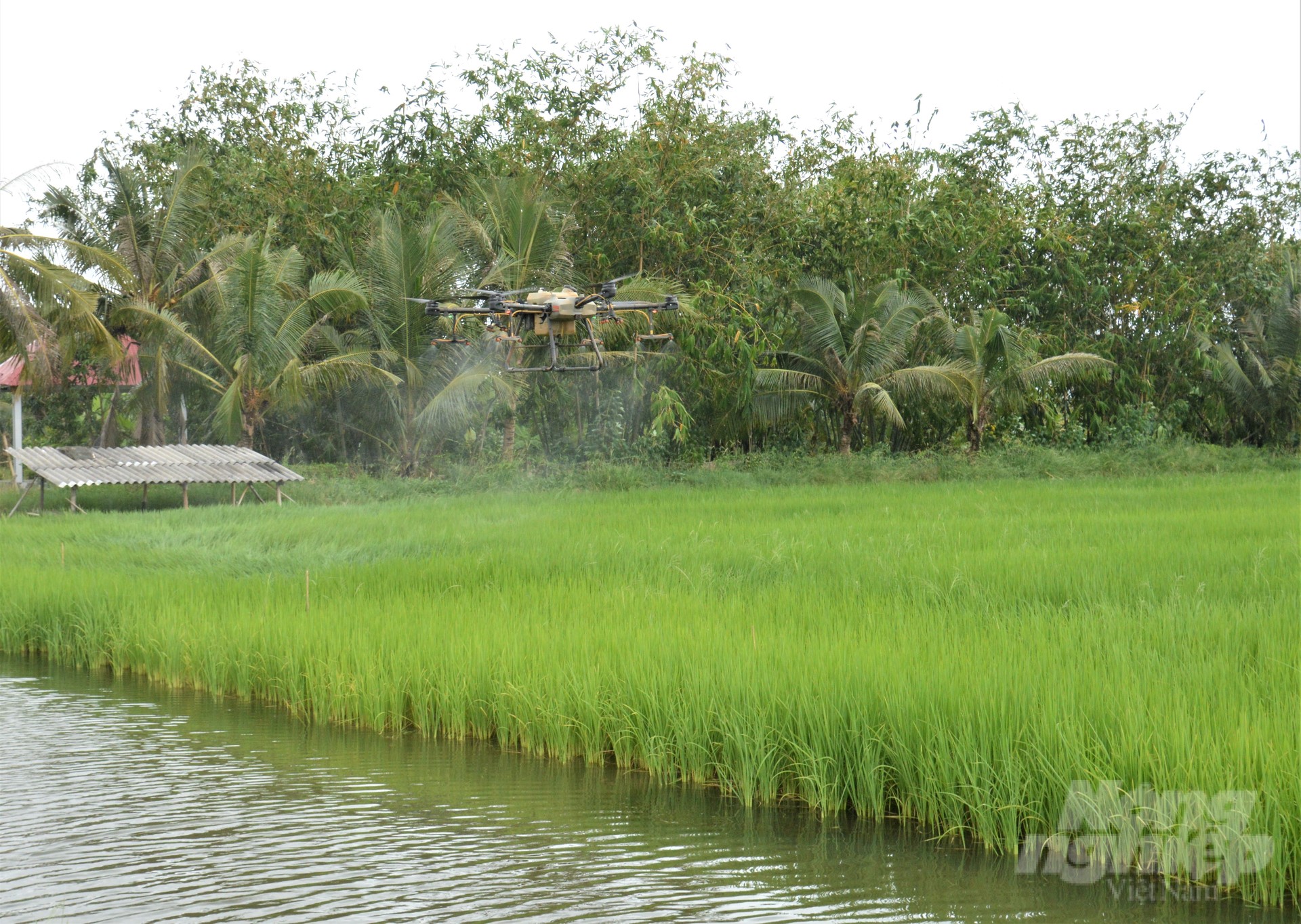
Farmers use drones to care for and protect rice, helping to ensure rice yield and quality. Photo: Trung Chanh.
Soc Trang province is a locality affected by climate change, so for many years, farmers have limited the sowing of the autumn-winter rice crop. However, in some areas located in freshwater areas with guaranteed water sources and on-farm irrigation systems, such as Ke Sach district and some communes in Thanh Tri and Chau Thanh districts, farmers still carry out 3 rice crops/year.
Thanh Tan Agricultural Cooperative in Thanh Tri district has just sown 60ha of autumn-winter rice and will sow completely in the next few days, ensuring an area of over 300ha of autumn-winter rice. Mr. Ly Thanh Cuong, Director of Thanh Tan Agricultural Cooperative, said that thanks to the benefits of the closed dike system, farmers can favorably produce 3 rice crops/year. Mr. Cuong assessed that, compared to the past few years, rice cultivation has never been as favorable as it is now. The price of rice changes day by day according to the increasing momentum, currently fluctuating at nearly VND 8,000/kg. Especially, the price of agricultural materials has been well controlled, pests are relatively few, creating motivation for farmers to produce.
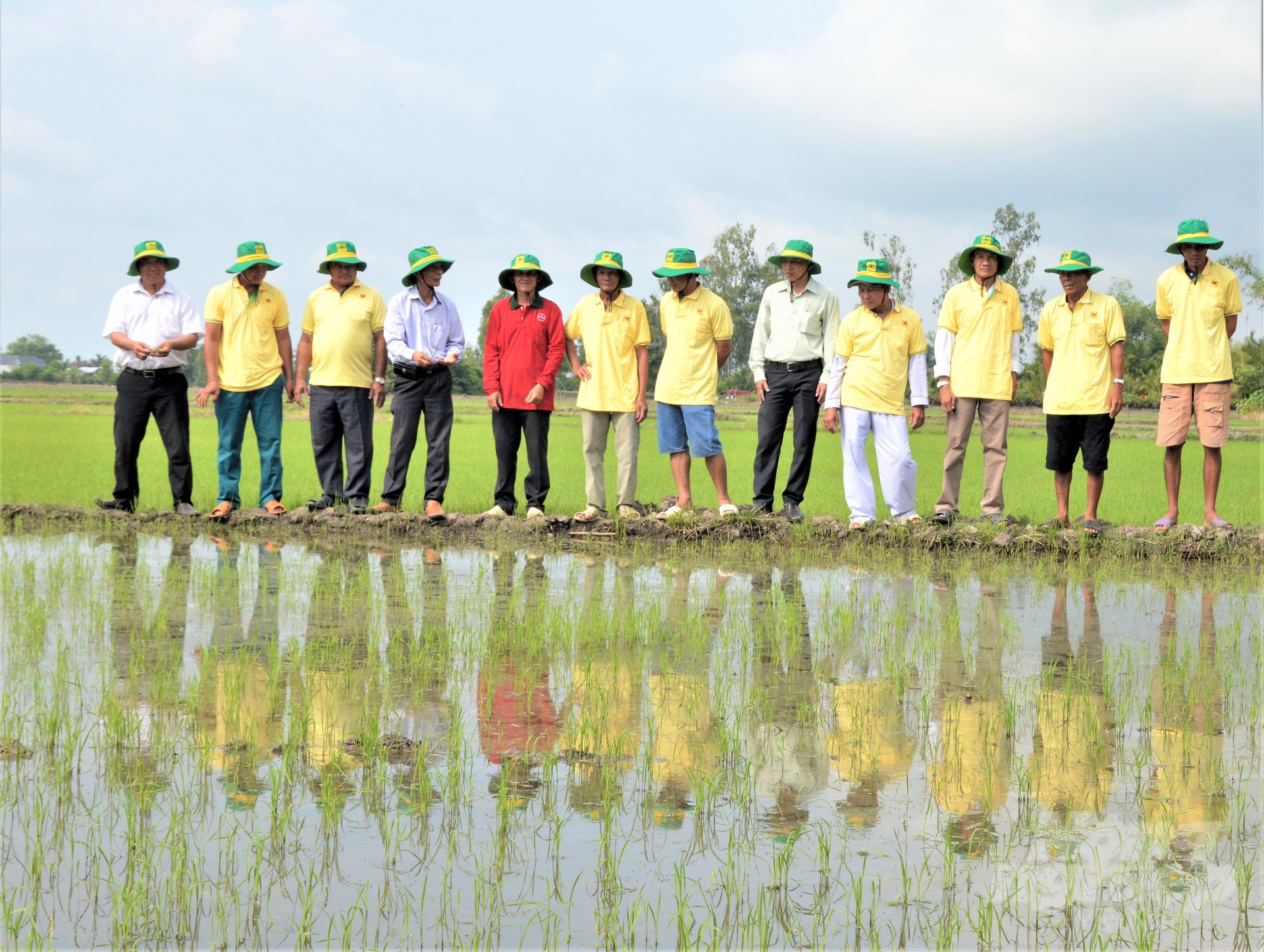
The 2023 autumn-winter crop in the Mekong Delta is forecast to have many favorable conditions for production, creating good conditions for farmers to associate in production and expand the area. Photo: Trung Chanh.
Currently, Soc Trang province is focusing on well-implementing the project of developing specialty rice for the 2022–2025 period. The project's goal is to reach 188,00 ha of specialty rice raw material area in the project area deployed in 2023. At the same time, maintain and develop 21 specialty rice raw material areas with an open area of 1,400ha, including consumption linkages in districts and towns.
In order to effectively implement the project in 2023, the Soc Trang Department of Agriculture and Rural Development has called on businesses and associated companies to consume rice products in the models that the project implements. Form and build concentrated specialty rice growing areas in the province in association with consumption linkages of rice products in the direction of increasing added value.
Mr. Tran Thai Nghiem, Deputy Director of the Can Tho City Department of Agriculture and Rural Development, said that with the current structure of 2-crop rice production in the Mekong Delta, if wishing to expand the area of autumn-winter rice, it is only necessary to apply some policies to encourage farmers. Mr. Nghiem proposed a solution of supporting and organizing linkages so that farmers can see benefits from production in the autumn-winter crop; thereby, they will boldly sow seeds. Especially the areas with 2 rice crops/year in the provinces of An Giang, Dong Thap, and Kien Giang will solve the problem of production expansion more easily.
Translated by Huyen Vu Thu

(VAN) The People's Committee of Tra Vinh province has approved an adjustment to the investment policy for the Green Hydrogen Plant project, increasing its area to approximately 52.76 hectares.
![Reducing emissions from rice fields: [2] Farmers’ commitment to the soil](https://t.ex-cdn.com/nongnghiepmoitruong.vn/608w/files/news/2025/05/05/dsc08881jpg-nongnghiep-140632.jpg)
(VAN) Clean rice cultivation model in Thuong Tan commune, Bac Tan Uyen district, is assisting local residents in achieving sustainable agriculture by substantially reducing costs, increasing productivity, and protecting the environment.

(VAN) At the conference to disseminate Resolution No. 68, AgriS introduced its digital agricultural ecosystem and reaffirmed its commitment to accompanying the Government in promoting private sector development and sustainable agriculture.

(VAN) 'Blue Ocean - Blue Foods' initiative is designed to restore marine ecosystems and establish sustainable livelihoods for local communities by cultivating a minimum of 1,000 hectares of cottonii seaweed in the first three years.
/2025/05/21/4642-3-112707_603.jpg)
(VAN) The V-SCOPE project has made direct contributions to three out of six pillars of the Comprehensive Strategic Partnership between Vietnam and Australia.

(VAN) Facing the threat of rabies spreading to the community, Gia Lai province urgently carries out measures to vaccinate dogs and cats on a large scale.

(VAN) Disease-free livestock farming not only protects livestock herds but also stabilizes production and livelihoods for many farmers in Tuyen Quang.